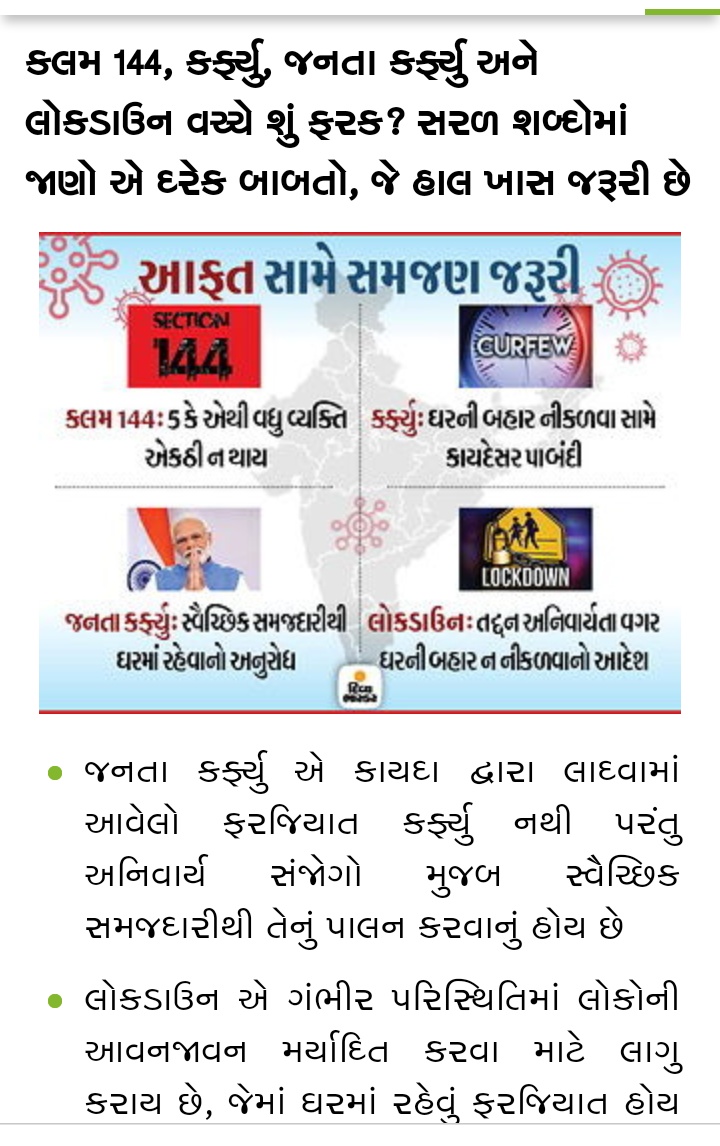What is the difference between Article 144, Curfew, Public Curfew and Lockdown? Simply put, know everything that is really needed right now
The public curfew is not a compulsory curfew imposed by law but has to be voluntarily complied with in the event of unforeseen circumstances.
Lockdown is applied to limit the movement of people in critical situations, where it is mandatory to stay home.
There are also stringent precautionary measures being taken by the administration in parallel to where Corona is growing. Most people are advised to stay home because of direct outbreaks due to direct contact. Article 144 has been implemented in every major city of Gujarat. The public has appealed to the Prime Minister to keep the curfew on Sunday. Also, if the situation worsens in the coming days, a lockdown will have to take place. Under these circumstances it is especially important to understand all four words, their interpretation and severity.
What is Article 144?
Article 144 of the CRPC is applied to establish peace or to avoid co-emergency situations.
This clause is applied when there is a security risk.
No more than five or more persons may be assembled under this Act.
A notification is issued by the local district officer. Internet service may also be suspended if required after applying section 144. Weapons are prohibited from possessing or possessing weapons.
Section 144 cannot be imposed for more than two months. If the state government feels that it is still needed to remove the risk from the person's life, then it can be extended.
In this case, it cannot be imposed for more than six months from the date of commencement of Article 144.
Anyone involved in the storm can be sued for illegally assembling. And a person can be sentenced to a maximum of three years in prison for this.
What is a curfew?
Curfew is imposed by the administration to avoid any public disturbance or public disturbance caused by people's exit.
Under special circumstances, the administration has a legal authority to impose a curfew.
During the curfew, the public must stay in the house and there may be legal proceedings for breaching the curfew.
Essential services like medical store, hospital, media during curfew can also be discontinued as per the circumstances.
Even if there is a compulsion the police cannot get out without permission. Only after the police has given a curfew pass can you proceed.
What is a People's Curfew?
The term public curfew suggests that it is spontaneous.
Not a curfew imposed by law. But given the circumstances, the people themselves choose to remain at home voluntarily as responsible citizens of the country.
In the case of an infectious infection like corona, having a curfew is a sensible appeal to avoid contact with people.
Exiting the house during the public curfew does not bring any legal action. But it is voluntary to stay in the house for so long.
Nevertheless, if an out-of-home exit is required for life's necessity, identification can be accomplished. Being able to leave home immediately after completing work would be more appropriate as a responsible citizen
What is a lockdown?
In the case of an emergency, the lockdown is the mechanism that is applied to limit the area to a particular area.
Corona is a disease spread by more individuals. The purpose of this lockdown is to keep everyone in their home and prevent the spread of the pandemic.
Exits are prohibited during the lockdown. But it can be excluded for purposes like cereals, milk, medicine or medical assistance but it is necessary to show specific reasons.
Exits can also be made for the purpose of assisting the elderly or children. It is essential to give satisfactory answers during inquiries of authorized persons (i.e. policemen). Otherwise legal action may be taken.
Currently, countries like China, Italy, Denmark, El Salvador, France, Spain, New Zealand have implemented lockdowns in certain areas and there have been positive results in terms of corona.
The US declared a 3-day lockdown to quell the chaos created after the 9/11 attacks. Then in 2013 the city of Boston also announced a lockdown to capture terrorists following the terrorist attacks.
The terrorist attack in Paris in 2015 triggered a lockdown in Brussels to capture the suspects.
During lockdown, compulsory services like health, defense, law and order, media continue to be issued, but those associated with these services cannot be left without credentials.
Coronavirus: Sec 144 imposed in major cities of Gujarat; state gears up for shutdown in ‘total support’ of Janata Curfew



No comments:
Post a Comment